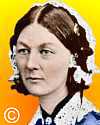 (source)
(source)
|
Florence Nightingale
(12 May 1820 - 13 Aug 1910)
English nurse and statistician , known as “The Lady With The Lamp,” who pioneered the improvement of nursing practices following her experience in the Crimean War, and continued to raise respect for nurses as medical professionals.
|
Science Quotes by Florence Nightingale (30 quotes)
>> Click for Florence Nightingale Quotes on | Health | Nurse | Patient |
>> Click for Florence Nightingale Quotes on | Health | Nurse | Patient |
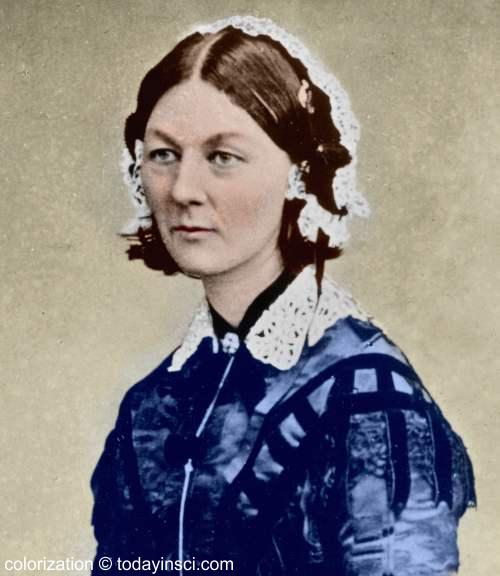
In a 1852 letter, Nightingale records the opinion of a young surgeon:
The account he gives of nurses beats everything that even I know of. This young prophet says that they are all drunkards, without exception, Sisters and all, and that there are but two whom the surgeon can trust to give the patients their medicines.
The account he gives of nurses beats everything that even I know of. This young prophet says that they are all drunkards, without exception, Sisters and all, and that there are but two whom the surgeon can trust to give the patients their medicines.
— Florence Nightingale
Letter to Miss H. Bonham Carter (8 Jan 1852), quoted in Edward Tyas Cook, The Life of Florence Nightingale (1914), Vol. 1, 116.
A celebrated medical lecturer began one day “Fumigations, gentlemen, are of essential importance. They make such an abominable smell that they compel you to open the window.” I wish all the disinfecting fluids invented made such an “abominable smell” that they forced you to admit fresh air. That would be a useful invention.
— Florence Nightingale
In Notes on Nursing: What It Is and What It Is Not (1860), 28.
A nurse is to maintain the air within the room as fresh as the air without, without lowering the temperature.
— Florence Nightingale
In Notes on Nursing: What It Is and What It Is Not (1859), 10.
All disease, at some period or other of its course, is more or less a reparative process, not necessarily accompanied with suffering: an effort of nature to remedy a process of poisoning or of decay, which has taken place weeks, months, sometimes years beforehand, unnoticed.
— Florence Nightingale
In Notes on Nursing: What It Is and What It Is Not (1859), 5.
Apprehension, uncertainty, waiting, expectation, fear of surprise, do a patient more harm than any exertion. Remember he is face to face with his enemy all the time.
— Florence Nightingale
In Notes on Nursing: What it is, and What it is Not (1860), 53.
Beggars in the streets of London were at that time leading the lives of princes, compared to the life of our soldiers in the Crimea when I arrived on the scene with thirty-six nurses.
— Florence Nightingale
As quoted in ‘Little Chats With Big People’, The Scrap Book (Jan 1908), 5, No. 1, 43.
For it may safely be said, not that the habit of ready and correct observation will by itself make us useful nurses, but that without it we shall be useless with all our devotion.
— Florence Nightingale
Notes on Nursing: What it is and what it is not (1860), 160.
For the sick it is important to have the best.
— Florence Nightingale
Examination for Inquiry on Scutari (20 Feb 1855). In Great Britain Parliament, Report upon the State of the Hospitals of the British Army in Crimea and Scutari, House of Commons Papers (1855), Vol. 33 of Sess 1854-55, 343.
Go into a room where the shutters are always shut (in a sick-room or a bed-room there should never be shutters shut), and though the room be uninhabited—though the air has never been polluted by the breathing of human beings, you will observe a close, musty smell of corrupt air—of air unpurified by the effect of the sun's rays.
— Florence Nightingale
Notes on Nursing: What it is and what it is not (1860), 120.
Hospitals are only an intermediate stage of civilization, never intended ... to take in the whole sick population. May we hope that the day will come ... when every poor sick person will have the opportunity of a share in a district sick-nurse at home.
— Florence Nightingale
In 'Nursing of the Sick' paper, collected in Hospitals, Dispensaries and Nursing: Papers and Discussions in the International Congress of Charities, Correction and Philanthropy, Section III, Chicago, June 12th to 17th, 1893 (1894), 457.

I attribute my success to this:— I never gave or took an excuse.
— Florence Nightingale
Letter (1861) to Miss H. Bonham Carter, transcribed in Edward Cook, The Life of Florence Nightingale (1913, 1914), Vol. 1, 506.
I do see the difference now between me and other men. When a disaster happens, I act and they make excuses.
— Florence Nightingale
Letter (1861) to Miss H. Bonham Carter, transcribed in Edward Cook, The Life of Florence Nightingale (1913, 1914), Vol. 1, 506. The “disaster” that resulted in this remark was when her dressing-room was flooded by a bad pipe from a water cistern. She had first been given an excuse that it resulted from a frost, but she persisted until the real cause was determined and remedied.
I think one’s feelings waste themselves in words; they ought all to be distilled into actions, and into actions which bring results.
— Florence Nightingale
Letter to Mary Clarke (1844), quoted in Sir Edward Tyas Cook in The Life of Florence Nightingale (1914), 94.
I use the word nursing for want of a better. It has been limited to signify little more than the administration of medicines and the application of poultices. It ought to signify the proper use of fresh air, light, warmth, cleanliness, quiet, and the proper selection and administration of diet—all at the least expense of vital power to the patient.
— Florence Nightingale
Notes on Nursing: What it is and what it is not (1860), 2.
If a patient is cold, if a patient is feverish, if a patient is faint, if he is sick after taking food, if he has a bed-sore, it is generally the fault not of the disease, but of the nursing.
— Florence Nightingale
In Notes on Nursing: What It Is and What It Is Not (1859), 6.
It is the unqualified result of all my experience with the sick that, second only to their need of fresh air, is their need of light; that, after a close room, what hurts them most is a dark room and that it is not only light but direct sunlight they want.
— Florence Nightingale
Notes on Nursing: What it is and what it is not (1860), 120.
It may seem a strange principle to enunciate as the very first requirement in a Hospital that it should do the sick no harm.
— Florence Nightingale
First sentence of Preface to Notes on Hospitals (1859, 3rd. Ed.,1863), iii.
Let people who have to observe sickness and death look back and try to register in their observation the appearances which have preceded relapse, attack or death, and not assert that there were none, or that there were not the right ones. A want of the habit of observing conditions and an inveterate habit of taking averages are each of them often equally misleading.
— Florence Nightingale
Notes on Nursing: What it is, and What it is Not (1860), 67.
Macaulay somewhere says, that it is extraordinary that, whereas the laws of the motions of the heavenly bodies, far removed as they are from us, are perfectly well understood, the laws of the human mind, which are under our observation all day and every day, are no better understood than they were two thousand years ago.
— Florence Nightingale
In Notes on Nursing: What It Is and What It Is Not (1859), 7.
No man, not even a doctor, ever gives any other definition of what a nurse should be than this—“devoted and obedient.” This definition would do just as well for a porter. It might even do for a horse. It would not do for a policeman.
— Florence Nightingale
Notes on Nursing: what it is and what it is not (1860), 200.
Nursing is an art: and if it is to be made an art, it requires an exclusive devotion as hard a preparation as any painter’s or sculptor’s work; for what is the having to do with dead canvas or dead marble, compared with having to do with the living body, the temple of God’s spirit? It is one of the Fine Arts: I had almost said, the finest of Fine Arts.
— Florence Nightingale
First published as a eulogy to an unnamed nurse in 'Una and the Lion', Good Words (1 Jun 1868), 360-366. Reprinted in Una and the Lion (1871), 6.
People say the effect is only on the mind. It is no such thing. The effect is on the body, too. Little as we know about the way in which we are affected by form, by color, and light, we do know this, that they have an actual physical effect. Variety of form and brilliancy of color in the objects presented to patients, are actual means of recovery.
— Florence Nightingale
Notes on Nursing: What it is and what it is not (1860), 84.
The first possibility of rural cleanliness lies in water supply.
— Florence Nightingale
Letter to the Medical Officer of Health (Nov 1891)
The only English patients I have ever known refuse tea, have been typhus cases; and the first sign of their getting better was their craving again for tea.
— Florence Nightingale
'Tea, Coffee, and Cocoa for the Sick', Scientific American (2 Jul 1860), New Series, 3, No. 1, 3.
The symptoms or the sufferings generally considered to be inevitable and incident to the disease are very often not symptoms of the disease at all, but of something quite different—of the want of fresh air, or of light, or of warmth, or of quiet, or of cleanliness, or of punctuality and care in the administration of diet, of each or of all of these.
— Florence Nightingale
In Notes on Nursing: What It Is and What It Is Not (1859), 5.
The true foundation of theology is to ascertain the character of God. It is by the aid of Statistics that law in the social sphere can be ascertained and codified, and certain aspects of the character of God thereby revealed. The study of statistics is thus a religious service.
— Florence Nightingale
As quoted by Florence Nightingale David in Games, Gods, and Gambling: A History of Probability and Statistical Ideas (1962, 1998), 103. David introduced the quote by saying “Florence Nightingale, after some lengthy calculations, wrote:”.
The very elements of what constitutes good nursing are as little understood for the well as for the sick. The same laws of health, or of nursing, for they are in reality the same, obtain among the well as among the sick.
— Florence Nightingale
Notes on Nursing: What it is and what it is not (1860), 4.
To understand God’s thoughts, one must study statistics, for these are the measure of His purpose.
— Florence Nightingale
This is expressed in narrative form, not within quotation marks, in Karl Pearson in The Life, Letters and Labours of Francis Galton (1924), Vol 2, 415. [Pearson writes, without quotes: But to understand God’s thoughts, she held we must study statistics, for these are the measure of his purpose. Thus the study of statistics was for her a religious duty.] Pearson elsewhere does use quotation marks when providing a direct quote for illustration from other speakers. Thus, Webmaster cautions that the subject quote above perhaps should not be regarded as verbatim; Pearson was expressing Nightingale’s outlook in his own words.
Unnecessary noise is the most cruel absence of care which can be inflicted either on sick or well.
— Florence Nightingale
In Notes on Nursing: What it is, and What it is Not (1860), 47.
When you see the natural and almost universal craving in English sick for their 'tea,' you cannot but feel that nature knows what she is about. … [A] little tea or coffee restores them. … [T]here is nothing yet discovered which is a substitute to the English patient for his cup of tea.
— Florence Nightingale
'Tea, Coffee, and Cocoa for the Sick', Scientific American (2 Jul 1860), New Series, 3, No. 1, 3.
Quotes by others about Florence Nightingale (4)
[Florence Nightingale] was a great administrator, and to reach excellence here is impossible without being an ardent student of statistics. Florence Nightingale has been rightly termed the “Passionate Statistician.” Her statistics were more than a study, they were indeed her religion. For her, Quetelet was the hero as scientist, and the presentation copy of his Physique Sociale is annotated by her on every page. Florence Nightingale believed—and in all the actions of her life acted upon that belief—that the administrator could only be successful if he were guided by statistical knowledge. The legislator—to say nothing of the politician—too often failed for want of this knowledge. Nay, she went further: she held that the universe—including human communities—was evolving in accordance with a divine plan; that it was man's business to endeavour to understand this plan and guide his actions in sympathy with it. But to understand God's thoughts, she held we must study statistics, for these are the measure of his purpose. Thus the study of statistics was for her a religious duty.
In Karl Pearson, The Life, Letters and Labours of Francis Galton (1924), Vol. 2, 414-5.
A Lady with a Lamp shall stand
In the great history of the land,
A noble type of good,
Heroic womanhood.
In the great history of the land,
A noble type of good,
Heroic womanhood.
'Santa Filomena' (1857), The Poetical Works of Henry Wadsworth Longfellow (1867), 333.
IN MEMORIAM: FLORENCE NIGHTINGALE
She whom we love, our Lady of Compassion,
Can never die, for Love forbids her death.
Love has bent down in his old kindly fashion,
And breathed upon her his immortal breath.
On wounded soldiers, in their anguish lying,
Her gentle spirit shall descend like rain.
Where the white flag with the red cross is flying,
There shall she dwell, the vanquisher of pain.
[In remembrance of 'The Lady of the Lamp' who died 13 Aug 1910.]
She whom we love, our Lady of Compassion,
Can never die, for Love forbids her death.
Love has bent down in his old kindly fashion,
And breathed upon her his immortal breath.
On wounded soldiers, in their anguish lying,
Her gentle spirit shall descend like rain.
Where the white flag with the red cross is flying,
There shall she dwell, the vanquisher of pain.
[In remembrance of 'The Lady of the Lamp' who died 13 Aug 1910.]
In New York Times (29 Aug 1910), 6. Collected in Summer of Love (1911), 72.
To her [Florence Nightingale] chiefly I owed the awakening to the fact that sanitation is the supreme goal of medicine its foundation and its crown.
In Pioneer Work in Opening the Medical Profession to Women (1895), 176.
See also:
- 12 May - short biography, births, deaths and events on date of Nightingale's birth.
- Large color picture of Florence Nightingale (1000 x 1334 px)
- Florence Nightingale - testimony she gave to Parliament on poor clothing, food supplies and the state of the hosital at Scutari (20 Feb 1855).
- Hospital Ward at Scutari - shown after the arrival of Florence Nightingale shown in a 1856 Lithograph (1000 x 638px)
- Florence Nightingale, Notes On Nursing - Nursing Quotes - Ventilation Quotes
- Florence Nightingale At Eighty-Five Says War Helps To Make Men Noble - from The Scrap Book (1908)
- A Remarkable Woman - Order of Merit for Florence Nightingale, from The Scrap Book (1908)
- Florence Nightingale - context of quote Study statistics - Medium image (500 x 350 px)
- Florence Nightingale - context of quote Study statistics - Large image (800 x 600 px)
- Florence Nightingale, Lady of the Lamp - transcript of a 1940s radio talk by Charles F. Kettering.
- Florence Nightingale: The Making of an Icon, by Mark Bostridge. - book suggestion.
- Booklist for Florence Nightingale.
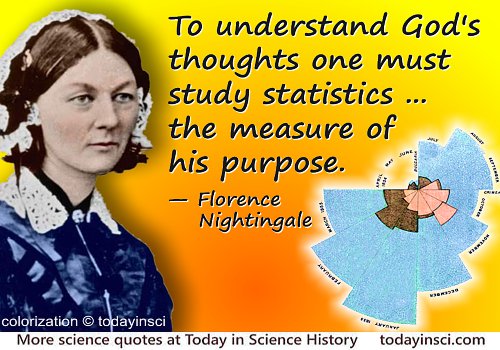
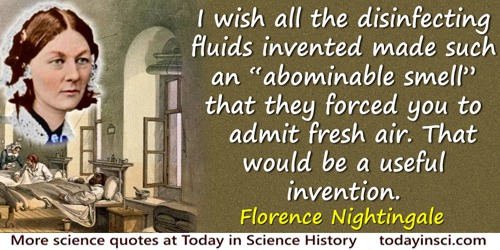
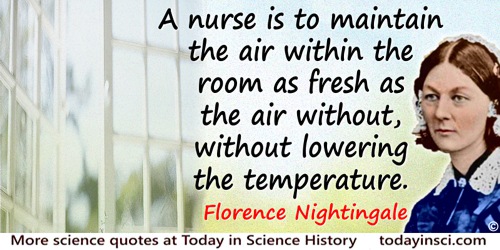
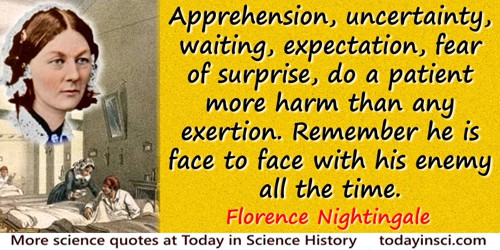
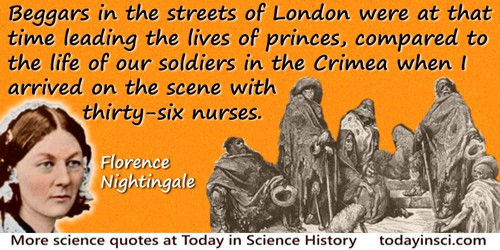

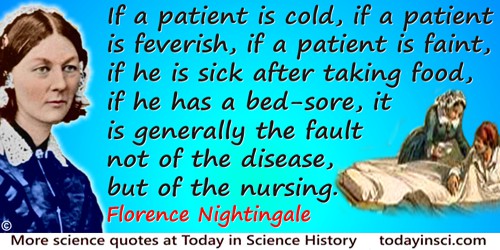
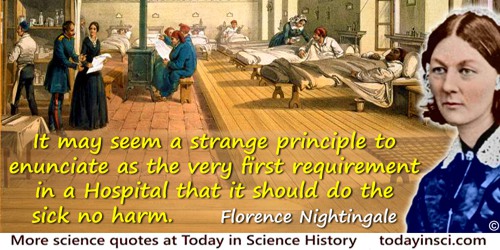
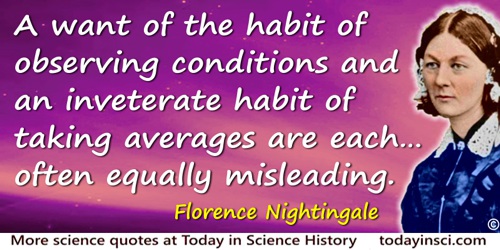
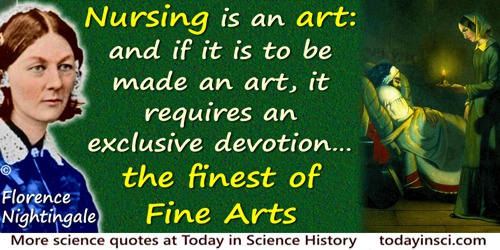

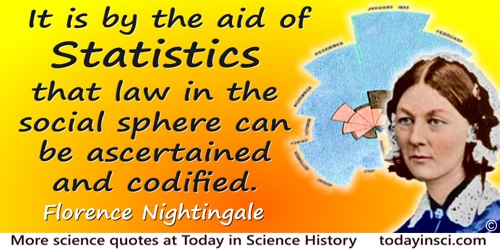
![Elizabeth Blackwell quote: To her [Florence Nightingale] chiefly I owed the awakening to the fact that sanitation is the supreme](https://todayinsci.com/B/Blackwell_Elizabeth/BlackwellElizabeth-Sanitation500x250px.jpg)

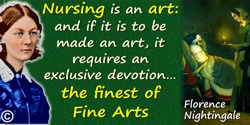
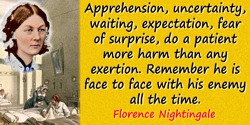
 In science it often happens that scientists say, 'You know that's a really good argument; my position is mistaken,' and then they would actually change their minds and you never hear that old view from them again. They really do it. It doesn't happen as often as it should, because scientists are human and change is sometimes painful. But it happens every day. I cannot recall the last time something like that happened in politics or religion.
(1987) --
In science it often happens that scientists say, 'You know that's a really good argument; my position is mistaken,' and then they would actually change their minds and you never hear that old view from them again. They really do it. It doesn't happen as often as it should, because scientists are human and change is sometimes painful. But it happens every day. I cannot recall the last time something like that happened in politics or religion.
(1987) -- 


